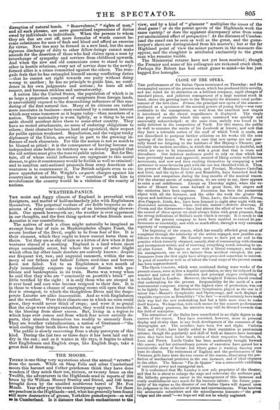WEATHER-PANICS.
THE moist and foggy climate of England is proverbial with foreigners, and matter of half-melancholy joke with Englishmen themselves. The perpetual verdure of our fields bespeaks us de- nizens of a rainy zone—inhabitants of an intermitting shower- bath. Our speech bewrayeth us ; the weather is ever uppermost in our thoughts, and the first thing spoken of when friends meet. Aquarius is our constellation. The natives of such a clime might naturally be imagined as exempt from fear of rain as Mephistopheles alleges Faust, the sworn brother of the Devil, ought to be from fear of lire. It is their element, which they ought to know cannot harm them or theirs. Yet they are as shy of rain as a kitten of dew when it first ventures abroad of a morning. England is a land where short crops occasionally occur, but where the years of utter blight winch often lay other lands desolate are scarcely known : despite our frequent wet, raw, and ungenial summers, within the me- mory a our fathers and fathers' fathers seed-time and harvest have not failed. Yet to an Englishman a wet month of July immediately conjures up visions of famine with pes- tilence and bankruptcies in its train. Burns was wrong when he said that they who are "constantly on poortith's brink" are little terrified by the sight : it is only those who are steeped in it over head and ears who become resigned to their fate. It is in those to whom a chance of emerging seems still open that the fear is strongest, to which the thoughtless Dives and the despe- perate Lazarus are alike inaccessible. And so with Englishmen and the weather. Were their climate one in which no corn could grow, they would never think of crops ; and were it so genial that the crops were always redundant, they would wax insensible to the blessing from sheer excess. But, living in a region to which hope ever comes and from which fear never entirely de- parts, they abandon themselves too readily to unmanly fears. They are weather valetudinarians, a nation of Gratianos—" the wind cooling their broth blows them to an ague."
The public is slowly recovering from a sharp paroxysm of this kind. During the last two or three days it has been laid out to dry in the sun ; and as it warms in the rays, it begins to admit that Englishmen and English crops, like English frogs, take a great deal of drowning.


























 Previous page
Previous page